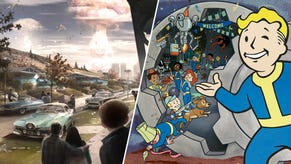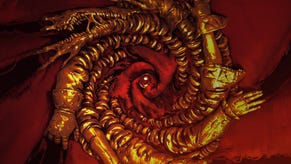Dear industry, grow up: Why the VGAs aren't the problem
Ragging on the VGAs is the in thing, but Nathan Grayson intends to call the critics out for their complicity in a wider-reaching problem.
I don't think the VGAs should change in the slightest. And, quite frankly, they never will - not unless Spike TV suddenly transforms into the Monocoles and Competitive Crocheting network, anyway. But really, that's not the issue. See, Spike's show wouldn't even exist – let alone possess this level of clout – without some of the biggest movers-and-shakers in the industry supporting it with all their might.
I watched a man get tea-bagged on national television a few Saturdays ago. Willingly.
Why, you ask? Well, because videogames, of course. For that very same reason, I also devoted precious eyeball fluid to Charlie Sheen's least relevant shenanigans yet, attempted to gnaw off my own ears during a torrent of terrible “jokes” (most of them hurled in fear to stave off the encroaching threat that is “female”), and nearly face-palmed myself into a coma as countless clueless celebrities stumbled across the stage like lost sheep. Speaking of farm animals, there was also a cow for some reason.
Unlike our very own The Internet's Johnny Cullen, however, I don't think the VGAs should change in the slightest. And, quite frankly, they never will -- not unless Spike TV suddenly transforms into the Monocoles and Competitive Crocheting network, anyway. But really, that's not the issue. See, Spike's show wouldn't even exist – let alone possess this level of clout – without some of the biggest movers-and-shakers in the industry supporting it with all their might.
And why, pray tell, do they willingly put their ad money where Spike's putrid, bile-spewing mouth is? Simple: you.
Occupy VGA street
“Spike should do it this way, Spike should do it that way,” you comment and tweet and shout. It happens every year, too – like clockwork. First, the pre-VGA hype hoopla sets in, and everyone noisily devours whatever morsels of info fall from Spike's promotional table. Then they all gather around their TV sets, fingers crossed that – finally – this will be the year when everyone's favorite network for Mountain-Dew-guzzling manchildren grows up. Spoiler alert: It doesn't. It never does.
But then you lose me. The show ends, the credits roll, and the Internet's mightiest keyboard warriors rehash their favorite battle cry: “The VGAs need to change! Spike should use this as a chance to elevate games as a medium!”
I'm sorry, what? Are we talking about the same television network here? Spike has made a business – one that has stayed afloat throughout multiple “tough economic climates” – by appealing to a very specific audience. Is it smart, cultured, or even the least bit tasteful? Hell no. But it works. And -- hideously depressing as it may be -- it probably rakes in a whole hell of a lot more cash than thoughtful chin-stroking and less than three dick jokes per minute. So why should Spike fix what isn't broken because we've suddenly decided – for one night, in between looking at “top ten gaming asses” lists and screaming at each other on forums about MW3 and BF3 – that games are high art?
It's not Spike's duty to give “core” gaming's stereotypical image a makeover. That job belongs to, you know, the gaming industry.
Let's get something straight: I'm not defending Spike TV. It is undoubtedly a cesspit, capable of spewing out nothing but shame, misery, and exciting new opportunities for “the producers of Jersey Shore.” But it's not Spike's duty to give “core” gaming's stereotypical image a makeover. That job belongs to, you know, the gaming industry. The publishers. The marketers. Yet they continue to save their biggest guns for the year's most juvenile award show. Why? Well, that's the part that makes my skin crawl: Because – on some level – they believe this is the most effective way to reach core gamers.
That's the real tragedy in this incredibly depressing state of affairs. Many of the folks deciding which games get the cash-hued greenlight and which ones go back to the drawing board because their main characters aren't bald or white enough look at the VGAs and say, “Yeah, my audience enjoys that. They'll pay attention to that. They'll give me a cut of their hard-earned money for games that debuted during that.” So the industry shacks up with Spike TV year-in and year-out because it doesn't think its consumers are any better. It's trapped in an abusive, broken relationship.
R-e-s-p-e-c-t, that is what it means to me
So then, the big boogeyman of a question: Does the “core” portion of the gaming industry deserve respect? Of course it does. Many developers pour their hearts and souls into these games, and plenty of fans are mature, well-adjusted people.
But look at how some of us behave. My “top ten asses” and BF3 vs MW3 examples may have been extreme, but that also means that they're the most visible. On top of that, our communities -- while slowly improving -- aren't the most accepting of folks who aren't straight white males between the ages of 18 and 34 (see: rampant sexism, racial slurs, etc on Xbox Live; the recent “Gaymer” controversy).
From the outside looking in, we're not critical or thoughtful. We're just loud, misogynistic, and easily distracted by bright lights and pretty colors. Is it any wonder that publishers and marketing types (and even some developers) think we'll stick to the VGAs like flies to a steaming heap of dung?
If this industry doesn't respect itself, no one else will. We can't beg for “artistic legitimacy” or what have you and leave it at that. Actions speak far, far louder than words, and right now we're all dropping the ball. There's no single guilty party here -- least of all Spike TV. Everyone's to blame.
If this industry doesn't respect itself, no one else will. The damning mainstream “news” reports and cringe-worthy ads marketed toward “gamers” won't take a hike unless we boot them out the door. We can't beg for “artistic legitimacy” or what have you and leave it at that. Actions speak far, far louder than words, and right now we're all dropping the ball. “Core” gamers are acting like loud, entitled children, and publishers are essentially waggling shiny car keys in their faces and speaking in babytalk. There's no single guilty party here -- least of all Spike TV. Everyone's to blame.
Core gaming's made some incredible strides in the past few years. The era of bleeps, bloops, and pixelated-princess-rescuing is ancient history. Growing up, however, doesn't happen overnight. It's a process, and the core gaming still has a lot to learn.









